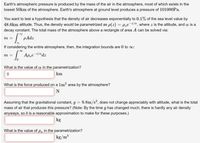Question
B3

Transcribed Image Text:Earth's atmospheric pressure is produced by the mass of the air in the atmosphere, most of which exists in the
lowest 50km of the atmosphere. Earth's atmosphere at ground level produces a pressure of 101000PA.
You want to test a hypothesis that the density of air decreases exponentially to 0.1% of the sea level value by
48.6km altitude. Thus, the density would be parametrized as p(z) = Poe¯z/a, where z is the altitude, and a is a
decay constant. The total mass of the atmosphere above a rectangle of area A can be solved via:
zf
т —
pAdz
If considering the entire atmosphere, then, the integration bounds are 0 to oo:
=| Ap,e=/ªdz
What is the value of a in the parametrization?
km
What is the force produced on a 1m² area by the atmosphere?
Assuming that the gravitational constant, g = 9.8m/s², does not change appreciably with altitude, what is the total
mass of air that produces this pressure? (Note: By the time g has changed much, there is hardly any air density
anyways, so it is a reasonable approximation to make for these purposes.)
kg
What is the value of p, in the parametrization?
kg/m³
Expert Solution
This question has been solved!
Explore an expertly crafted, step-by-step solution for a thorough understanding of key concepts.
Step by stepSolved in 5 steps

Knowledge Booster
Similar questions
- If I1 / I0=4/5 find I2/I0.arrow_forwardGiven the vectors Ā = (2î – î)N and B = (3î+ î)m Then, 3A B equals a. 5 N m O b. -5 N m C. 15 N m O d.-15 N marrow_forwardThis time, V = 59.9 V; R1 = 134 Ohms; R2 = 153 Ohms; R3 = 130 Ohms; R4 = 186 Ohms; R5 = 121 Ohms; and R6 = 93 Ohms. How much current flows through resistor R4? 0.073A 0.093A 0.166A 0.029A 5 points Saarrow_forward
- B The sum of vectors A and B is O O Oarrow_forward4. Consider again the situation given in Problem 1. (a) Find the center-of-mass of the system made up of m, and m,, taking the origin to be at P. (b) Draw a free body force diagram with the all of the mass (m, + m,) concentrated at this center-of-mass position. (c) Find the torque about P due to (m, + m2) concentrated at this center of mass position. How does this result compare to (d) in Problem 1? [We will make use of this technique often for certain types of future problems.]arrow_forwardDetermine F1 and the angle of Theta. If the magnitude of the resultant force acting on the eyebolt is 800N and its direction measured clockwise from the positive x axis theta=30.arrow_forward
arrow_back_ios
SEE MORE QUESTIONS
arrow_forward_ios